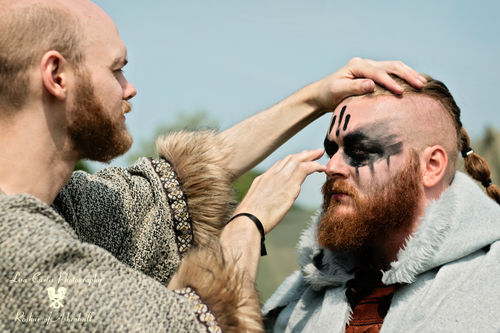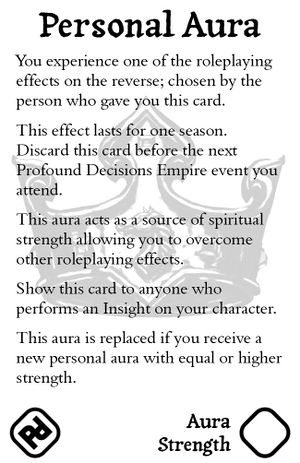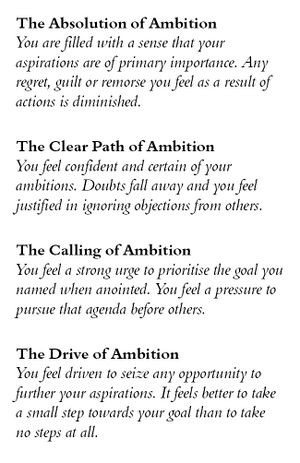Anointing
m (→True Liao) |
|||
| (14 intermediate revisions by 5 users not shown) | |||
| Line 1: | Line 1: | ||
{{CaptionedImage|file=Wintermark Anointing.jpg|caption=[[Liao]] is often mixed with pigment and used to mark the forehead of the recipient.|align=left|width=500}} | |||
==Overview== | ==Overview== | ||
By anointing a person, the priest creates a potent personal [[aura]] on them drawn from their virtue. An anointing provides two key benefits. Firstly, it produces a [[roleplaying effect]] which will influence the way the recipient acts. Secondly, any personal aura will also provide [[Aura#Personal_Aura|a source of spiritual strength to overcome a malign roleplaying effect]]. | By anointing a person, the priest creates a potent personal [[aura]] on them drawn from their virtue. An anointing provides two key benefits. Firstly, it produces a [[roleplaying effect]] which will influence the way the recipient acts. Secondly, any personal aura will also provide [[Aura#Personal_Aura|a source of spiritual strength to overcome a malign roleplaying effect]]. | ||
A character may only have one personal aura on them at once, so creating a new aura automatically replaces any existing standard aura. A | A character may only have one personal aura on them at once, so creating a new aura automatically replaces any existing standard aura. A stronger aura is more difficult to remove. Characters with the same virtue can cooperate to perform an anointing to create a stronger aura or to remove or replace an existing one. | ||
Anointing is not the only way that a person may experience a powerful, personal aura. Powerful spirits, curses and some dangerous experiences have the ability to create auras, and in theory a personal aura can manifest spontaneously - although this is | Anointing is not the only way that a person may experience a powerful, personal aura. Powerful spirits, curses and some dangerous experiences have the ability to create auras, and in theory a personal aura can manifest spontaneously - although this is very rare. | ||
{{Aura Links}} | {{Aura Links}} | ||
==Performance== | ==Performance== | ||
* '''Requires a dose of liao | * '''Requires a dose of liao and at least ten seconds of appropriate roleplaying''' | ||
* ''' | * '''Does not require the presence of a referee''' | ||
* '''Requires a willing target''' | * '''Requires a willing target''' | ||
* '''The priest must choose which aura they are creating during the ceremony''' | * '''The priest must choose which aura they are creating during the ceremony''' | ||
Anointing a character uses a dose of liao. It requires at least ten seconds of appropriate roleplaying to perform the ceremony and target must be close enough to touch throughout. The target must be willing. If they are unwilling or unaware of the purpose of the ceremony | Anointing a character uses a dose of [[liao]]. It requires at least ten seconds of appropriate roleplaying to perform the ceremony and target must be close enough to touch throughout. The target must be willing. If they are unwilling or unaware of the purpose of the ceremony - that is they are unaware that you are anointing them and that this will create a personal aura on them - it fails. | ||
After you anoint a character, they are infused with a standard [[Aura#Personal_Aura|personal aura]] that makes them subject to a [[roleplaying effects|roleplaying effect]] chosen by you. You can choose one aura from the list available for the virtue you are dedicated to. | After you anoint a character, they are infused with a standard [[Aura#Personal_Aura|personal aura]] that makes them subject to a [[roleplaying effects|roleplaying effect]] chosen by you. You can choose one aura from the list available for the virtue you are dedicated to. | ||
{{CaptionedImage|file=AuraCard.jpg|align=right|width=300}} | |||
==Effects== | ==Effects== | ||
* '''Anointing creates a [[aura|personal aura]] on a character''' | * '''Anointing creates a [[aura|personal aura]] on a character''' | ||
* ''' | * '''Given appropriate aura card to the target and show them the aura you have chosen''' | ||
* '''The aura provides a source of spiritual strength for overcoming [[roleplaying effects]]''' | |||
* '''The effect lasts until the start of the next Profound Decisions Empire event''' | * '''The effect lasts until the start of the next Profound Decisions Empire event''' | ||
* '''[[orc|Orcs]] can be the subject of an anointing''' | * '''[[orc|Orcs]] can be the subject of an anointing''' | ||
Anointing a character creates a personal [[aura]] that lasts until the start of the next Profound Decisions event. A character can only be under the effect of one personal aura at a time. The [[Religious skills#Ceremony Strength|strength]] of the aura determines how hard it is to remove or replace the aura. | Anointing a character creates a personal [[aura]] that lasts until the start of the next Profound Decisions event. A character can only be under the effect of one personal aura at a time. The [[Religious skills#Ceremony Strength|strength]] of the aura determines how hard it is to remove or replace the aura. | ||
When you anoint a character you must give the target an aura card - and indicate which one of the four auras available you have chosen to create. Aura cards are freely available in GOD for anyone playing a priest dedicated to a virtue with the anointing skill, you can collect them at any time. They exist so that you can give an aura card to the target when you perform an anointing - the card is entirely OOC and has no game effect until one or more doses of liao are used to create the aura. | |||
==Removal== | ==Removal== | ||
| Line 35: | Line 38: | ||
The anointing skill can also be used to remove personal auras arising from other sources, including those created by some [[enchantment|enchantments]] such as [[The Conspirator's Cloak]]. | The anointing skill can also be used to remove personal auras arising from other sources, including those created by some [[enchantment|enchantments]] such as [[The Conspirator's Cloak]]. | ||
A | A [[Aura#Strong Auras|strong aura]] is more difficult to remove - it can only be replaced or removed by multiple characters cooperating to create an anointing of equal or higher [[religious skills#Ceremony Strength|strength]]. | ||
{{CaptionedImage|file=Ambition.jpg|align=right|width=300}} | |||
== | |||
==True Liao== | ==True Liao== | ||
* '''True liao can be used in place of liao to perform the anointing ceremony''' | * '''True liao can be used in place of liao to perform the anointing ceremony''' | ||
You can use true liao in place of normal liao to perform an anointing ceremony. This will create a [[Aura# | <onlyinclude>You can use true liao in place of normal liao to perform an anointing ceremony. This will create a [[Aura#Strong_Auras|true aura]] which can only be removed using true liao and is [[Aura#Durable_Auras|durable]] - it will last at least as long as the character is alive and perhaps even longer than that. </onlyinclude> | ||
{{Ceremonial skills further reading}} | {{Ceremonial skills further reading}} | ||
Latest revision as of 13:52, 8 March 2023

Overview
By anointing a person, the priest creates a potent personal aura on them drawn from their virtue. An anointing provides two key benefits. Firstly, it produces a roleplaying effect which will influence the way the recipient acts. Secondly, any personal aura will also provide a source of spiritual strength to overcome a malign roleplaying effect.
A character may only have one personal aura on them at once, so creating a new aura automatically replaces any existing standard aura. A stronger aura is more difficult to remove. Characters with the same virtue can cooperate to perform an anointing to create a stronger aura or to remove or replace an existing one.
Anointing is not the only way that a person may experience a powerful, personal aura. Powerful spirits, curses and some dangerous experiences have the ability to create auras, and in theory a personal aura can manifest spontaneously - although this is very rare.
| Auras by virtue |
|---|
| Ambition |
| Courage |
| Loyalty |
| Pride |
| Prosperity |
| Vigilance |
| Wisdom |
Performance
- Requires a dose of liao and at least ten seconds of appropriate roleplaying
- Does not require the presence of a referee
- Requires a willing target
- The priest must choose which aura they are creating during the ceremony
Anointing a character uses a dose of liao. It requires at least ten seconds of appropriate roleplaying to perform the ceremony and target must be close enough to touch throughout. The target must be willing. If they are unwilling or unaware of the purpose of the ceremony - that is they are unaware that you are anointing them and that this will create a personal aura on them - it fails.
After you anoint a character, they are infused with a standard personal aura that makes them subject to a roleplaying effect chosen by you. You can choose one aura from the list available for the virtue you are dedicated to.
Effects
- Anointing creates a personal aura on a character
- Given appropriate aura card to the target and show them the aura you have chosen
- The aura provides a source of spiritual strength for overcoming roleplaying effects
- The effect lasts until the start of the next Profound Decisions Empire event
- Orcs can be the subject of an anointing
Anointing a character creates a personal aura that lasts until the start of the next Profound Decisions event. A character can only be under the effect of one personal aura at a time. The strength of the aura determines how hard it is to remove or replace the aura.
When you anoint a character you must give the target an aura card - and indicate which one of the four auras available you have chosen to create. Aura cards are freely available in GOD for anyone playing a priest dedicated to a virtue with the anointing skill, you can collect them at any time. They exist so that you can give an aura card to the target when you perform an anointing - the card is entirely OOC and has no game effect until one or more doses of liao are used to create the aura.
Removal
- Anointing lasts until the start of the next Profound Decisions Empire event, or until removed or replaced.
- The anointing skill can be used to remove a personal aura.
As with any aura, you can only be under the effect of one personal aura at once. Any character with the anointing skill (including one who is not dedicated to a Virtue) may replace an existing aura by creating a new one or they may use the skill purely to remove an existing anointing.
The anointing skill can also be used to remove personal auras arising from other sources, including those created by some enchantments such as The Conspirator's Cloak.
A strong aura is more difficult to remove - it can only be replaced or removed by multiple characters cooperating to create an anointing of equal or higher strength.
True Liao
- True liao can be used in place of liao to perform the anointing ceremony
You can use true liao in place of normal liao to perform an anointing ceremony. This will create a true aura which can only be removed using true liao and is durable - it will last at least as long as the character is alive and perhaps even longer than that.
Further Reading
- Ceremonial Skills
- Additional Information

